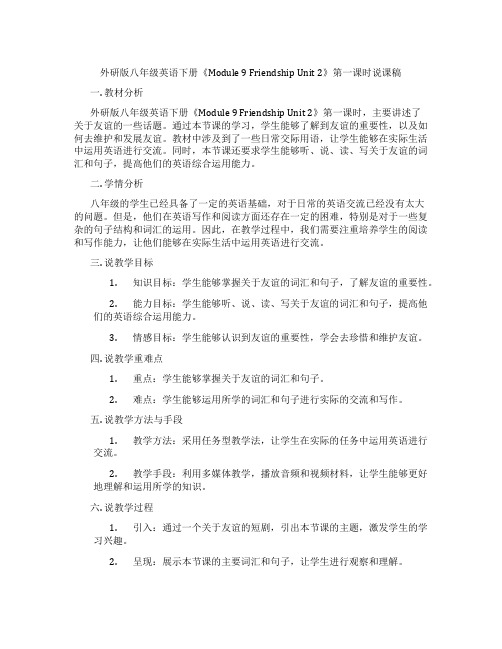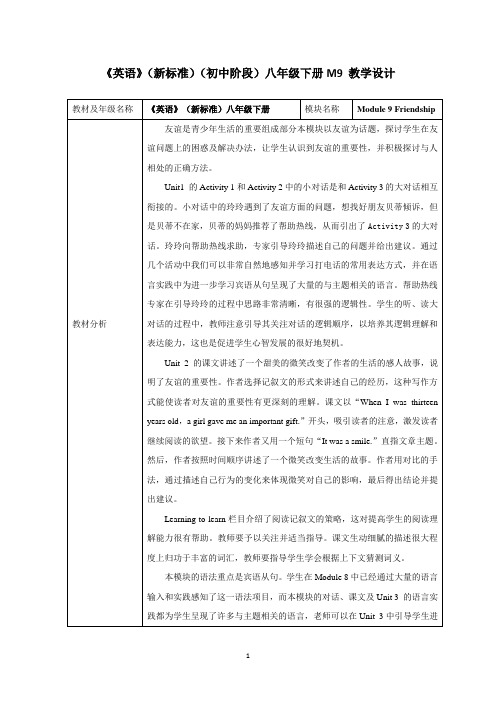外研版八年级英语下册Module 9 Friendship 教案
外研版八年级下册英语(新)《Module 9 Friendship Unit 2》教学设计2

外研版八年级下册英语(新)《Module 9 Friendship Unit 2》教学设计2一. 教材分析《Module 9 Friendship Unit 2》主要讲述了友谊的重要性以及如何维护友谊。
本节课的主要内容包括:1. 学习与朋友相处时可能遇到的问题及解决方法;2. 学会表达自己对朋友的感激之情;3. 提高在实际情境中运用英语的能力。
本节课所涉及的主要词汇有:argue, fight, understand, support等。
主要句型有:How can we solve the problem?和What can we do to help?等。
二. 学情分析八年级的学生已经掌握了基本的英语语法和词汇,具备一定的听说读写能力。
但是,学生在实际运用英语表达自己的观点和情感方面还存在一定的困难。
此外,学生对友谊的理解和维护友谊的方法还需要进一步引导和培养。
三. 教学目标1.知识目标:学生能够掌握本节课的主要词汇和句型,并能够在实际情境中运用。
2.能力目标:学生能够用英语表达自己对友谊的观点和情感,提高交际能力。
3.情感目标:学生能够理解友谊的重要性,学会珍惜和维护友谊。
四. 教学重难点1.重点:学生能够掌握本节课的主要词汇和句型。
2.难点:学生能够在实际情境中运用所学知识表达自己的观点和情感。
五. 教学方法1.任务型教学法:通过设置各种任务,让学生在完成任务的过程中运用所学知识,提高实际运用能力。
2.情境教学法:创设各种情境,让学生在真实的语境中学习英语,提高交际能力。
3.情感教学法:引导学生理解友谊的重要性,培养学生的情感素养。
六. 教学准备1.教师准备:准备好本节课所需的课件、教学素材、作业等。
2.学生准备:学生提前预习本节课的内容,熟悉相关词汇和句型。
七. 教学过程1.导入(5分钟)教师通过向学生提问:“What’s the most important thing in your life?”引导学生思考友谊的重要性,从而引出本节课的主题。
外研版八年级英语下册《Module9FriendshipUnit2》第一课时说课稿

外研版八年级英语下册《Module 9 Friendship Unit 2》第一课时说课稿一. 教材分析外研版八年级英语下册《Module 9 Friendship Unit 2》第一课时,主要讲述了关于友谊的一些话题。
通过本节课的学习,学生能够了解到友谊的重要性,以及如何去维护和发展友谊。
教材中涉及到了一些日常交际用语,让学生能够在实际生活中运用英语进行交流。
同时,本节课还要求学生能够听、说、读、写关于友谊的词汇和句子,提高他们的英语综合运用能力。
二. 学情分析八年级的学生已经具备了一定的英语基础,对于日常的英语交流已经没有太大的问题。
但是,他们在英语写作和阅读方面还存在一定的困难,特别是对于一些复杂的句子结构和词汇的运用。
因此,在教学过程中,我们需要注重培养学生的阅读和写作能力,让他们能够在实际生活中运用英语进行交流。
三. 说教学目标1.知识目标:学生能够掌握关于友谊的词汇和句子,了解友谊的重要性。
2.能力目标:学生能够听、说、读、写关于友谊的词汇和句子,提高他们的英语综合运用能力。
3.情感目标:学生能够认识到友谊的重要性,学会去珍惜和维护友谊。
四. 说教学重难点1.重点:学生能够掌握关于友谊的词汇和句子。
2.难点:学生能够运用所学的词汇和句子进行实际的交流和写作。
五. 说教学方法与手段1.教学方法:采用任务型教学法,让学生在实际的任务中运用英语进行交流。
2.教学手段:利用多媒体教学,播放音频和视频材料,让学生能够更好地理解和运用所学的知识。
六. 说教学过程1.引入:通过一个关于友谊的短剧,引出本节课的主题,激发学生的学习兴趣。
2.呈现:展示本节课的主要词汇和句子,让学生进行观察和理解。
3.操练:通过一些小组活动,让学生在实际的语言环境中进行交流和运用。
4.练习:通过一些听力、口语、阅读和写作的练习,让学生巩固所学的知识。
5.巩固:通过一些游戏和活动,让学生在轻松的氛围中复习和巩固所学的知识。
外研版英语八下Module9《Friendship》(Unit2)说课稿

外研版英语八下Module 9《Friendship》(Unit 2)说课稿一. 教材分析外研版英语八下Module 9《Friendship》(Unit 2)主要讲述友谊的重要性以及如何维护友谊。
本节课的主要内容是讲述一个叫Diana的女孩,她和朋友之间发生了一些误会,通过沟通和理解,最终重拾友谊的故事。
教材内容贴近学生的生活,能够激发学生对友谊的思考,培养学生的英语语言能力。
二. 学情分析八年级的学生已经具备一定的英语基础,对于友谊这个主题,他们有自己的理解和体验。
然而,学生在英语表达方面还存在一定的困难,需要通过教师的引导和帮助,提高他们的英语听说读写能力。
三. 说教学目标1.知识目标:学生能够掌握本节课的生词和短语,理解文章的主旨大意,以及Diana和朋友之间误会的原因和解决过程。
2.能力目标:学生能够运用所学知识,用英语进行简单的交流,描述自己对于友谊的理解和经历。
3.情感目标:通过学习本节课的内容,学生能够更加珍惜友谊,学会理解和包容朋友,提高自己的人际交往能力。
四. 说教学重难点1.重点:学生能够掌握本节课的生词和短语,理解文章的主旨大意。
2.难点:学生能够运用所学知识,用英语进行复杂的交流,描述自己对于友谊的理解和经历。
五. 说教学方法与手段1.情境教学法:通过设置情境,让学生在真实的语境中学习英语,提高他们的语言运用能力。
2.任务型教学法:通过完成任务,让学生在实践中学习英语,提高他们的学习兴趣和动力。
3.小组合作学习:通过小组讨论和分享,让学生互相学习,互相帮助,提高他们的合作能力和沟通能力。
六. 说教学过程1.导入:教师通过提问方式引导学生谈论友谊的重要性,激发学生的学习兴趣。
2.呈现:教师通过展示文章图片,引导学生预测文章内容,激发学生的学习好奇心。
3.阅读:教师引导学生阅读文章,回答相关问题,帮助学生理解文章的主旨大意。
4.听力:教师播放听力材料,学生完成相关练习,提高学生的听力能力。
外研版英语八下Module 9《Friendship》(Unit 1)教学设计

外研版英语八下Module 9《Friendship》(Unit 1)教学设计一. 教材分析本课选自外研版英语八下Module 9《Friendship》(Unit 1),主要讲述了友谊的重要性以及如何维护友谊。
通过本课的学习,学生能够进一步了解友谊的本质,提高交际能力,培养良好的人际关系。
本课包括三个部分:Part A, Part B和Part C。
Part A主要介绍友谊的重要性;Part B通过一个故事讲述如何维护友谊;Part C则是一个关于友谊的讨论。
二. 学情分析八年级的学生已经具备了一定的英语基础,对友谊这个主题也有一定的了解。
但部分学生在口语表达和听力方面还存在困难,因此需要在教学过程中给予针对性的指导。
三. 教学目标1.知识目标:学生能够掌握有关友谊的词汇和表达方式,理解课文内容,提高阅读能力。
2.能力目标:学生能够运用所学知识进行口语交流,提高听力理解能力。
3.情感目标:学生能够认识到友谊的重要性,学会珍惜和维护友谊。
四. 教学重难点1.重点:友谊的词汇和表达方式,课文内容的理解。
2.难点:如何运用所学知识进行口语交流,提高听力理解能力。
五. 教学方法1.任务型教学法:通过完成各种任务,激发学生的学习兴趣,提高学生的参与度。
2.情境教学法:创设真实的语境,让学生在实践中学会运用英语。
3.交际教学法:注重师生互动,生生互动,提高学生的口语表达能力。
六. 教学准备1.教材:外研版英语八下Module 9《Friendship》(Unit 1)。
2.多媒体设备:投影仪、电脑、音响等。
3.教学课件:根据教学内容制作的课件。
4.学习资料:相关友谊的图片、文章等。
七. 教学过程1.导入(5分钟)利用多媒体展示一些关于友谊的图片,引导学生谈论友谊的重要性。
教师提问:“What is friendship? Why is it important?”,让学生发表自己的看法。
2.呈现(10分钟)教师播放课文录音,让学生跟随录音朗读。
外研版八年级英语下册《Module9FriendshipUnit2》第一课时教学设计

外研版八年级英语下册《Module 9 Friendship Unit 2》第一课时教学设计一. 教材分析外研版八年级英语下册《Module 9 Friendship Unit 2》主要讲述了友谊的重要性以及如何维护友谊。
本课时主要通过一个关于朋友间的帮助和理解的故事,让学生学会如何用英语表达友谊的重要性以及如何在困难时互相支持。
教材内容主要包括对话、阅读理解和任务型活动,旨在提高学生的口语、阅读和写作能力。
二. 学情分析八年级的学生已经具备了一定的英语基础,能够进行简单的日常交流。
但他们在口语表达、阅读理解和写作能力上还存在一定的困难。
因此,在教学过程中,需要注重激发学生的学习兴趣,提高他们的自信心,引导他们主动参与课堂活动。
三. 教学目标1.能熟练朗读并表演对话;2.能理解故事情节,概括文章大意;3.能够用英语讨论友谊的重要性,表达自己在困难时的需求和帮助;4.提高学生的团队合作能力和口头表达能力。
四. 教学重难点1.重点:掌握对话内容,能用英语进行角色扮演;2.难点:理解阅读文章的深层含义,能够用英语表达友谊的重要性。
五. 教学方法1.任务型教学法:通过设定各种任务,让学生在完成任务的过程中运用所学知识;2.情境教学法:创设生活情境,让学生在真实的环境中学习英语;3.互动式教学法:鼓励学生积极参与课堂活动,提高他们的口头表达能力。
六. 教学准备1.准备对话和阅读理解的文本材料;2.制作多媒体课件,包括图片、音频和视频等;3.准备角色扮演的任务卡片;4.准备相关话题的讨论问题。
七. 教学过程1.导入(5分钟)通过展示一张友谊的图片,引导学生谈论他们的好朋友,分享友谊的故事,激发学生的学习兴趣。
2.呈现(10分钟)向学生介绍本节课的主要内容:一个关于朋友间的帮助和理解的故事。
呈现对话和阅读理解的文本材料,让学生初步感知友谊的重要性。
3.操练(10分钟)将学生分成小组,让他们根据对话内容进行角色扮演。
外研版英语(新标准)八年级下册《Module 9 Friendship》教案设计

How long have you been friends?
Do you have any problems with him/her?
Do you often make telephone calls with your friend?
拉链式提问,通过自由谈话活动进行课前热身,引发学生们说的兴趣,并自然而然地引出本节课所学内容。
教学辅助
Multi-media, blackboard
教学策略
Bottom-up, PWP approach,interactive approach
教学内容
教学活动
设计意图
教师活动
学生活动
Step1:
课前热身活动:(老师提问,学生回答;然后学生自由谈话)
Do you have many friends?
2、Instruct the Ssto be able to talk about a personal experience with friends, esp.be able to give and ask for personal information and give proper advice.
五、文化意识:
了解西方人的交友方式和国际笔友会的情况。
教学重点及难点
重点:
1、掌握对话、课文内容相关的词汇和句型。
2、掌握if, whether, who, what, how, why, where,when引导的宾语从句
难点:
1、能听懂有关友谊的对话,能理解对话中的逻辑顺序并能提供个人信息、询问他人信息并能提出建议。
Can you tell me how she’s different?
外研版(新标准)英语八年级下册Module 9 Friendship教学设计
Module9 Friendship一、教学内容:Unit1Could I ask if you’ve mentioned this to her?二、课型:Listening and speaking三、教学目标:1、能够正确使用下列单词和词组:separate explain mentionherself whether lonely regret patient introduce join in encourage sb. to do refuse to do regret doing sth. mentione sth. to sb.2、能使用if, when, what, why等引导词引导的宾语从句。
3、能够听懂听懂关于友谊的描述并获取当中的相关信息。
4、能够描述与朋友之间的信息并给出建议。
四、教学重难点:1、能使用if, when, what, why等引导词引导的宾语从句。
2、能够描述与朋友之间的信息并给出建议。
(难点)五、教学准备:课堂整体运用任务型教学模式,培养学生独立自主的学习能力。
本课指导学生通过听说获取信息,培养学生的听说技能。
在教学过程中,采用多媒体手段辅助教学,利用各种图片和习题任务贯穿整个教学过程。
因此,本节课需准备:PPT课件、挂图、课堂练习表格、奖品六、教学过程:七、板书设计:Module 9 FriendshipUnit1. Could I ask if you’ve mentioned this to her?1) Could I ask if you’ve mentioned this to her?mention sth. to sb. Don’t mention this matter to the others. 2) we got separated when we went to …get \ be separated3) feel \ be sure of onese lf…有信心,自信He often feels sure of himself.4)regret doing sth. 后悔做了…regret to do sth. 对要去做的事情感到遗憾5)be patient with sb.My mum is always patient with me.6) Try to find out whether she feels lonely without you. ( whether…or not \ if…)7) Read the dialogue and find out the Object Clause in the dialogue.8)Find out the expressions when you make a phone call.达标训练题一.翻译下列短语:1. 友情热线______________2.分开________________________________3. 保持联系_______________4. 向某人提及某事_____________________5. 拒绝做某事_____________6. 自信______________________________7. 对……有耐心___________ 8. 后悔做了某事_______________________9. 和…..交朋友____________ 10. 鼓励某人做某事____________________二、翻译句子。
最新外研版八年级英语下册Module9Friendship教案
Module 9 Friendship【教材分析】Module 9的主要内容为运用whether/if和疑问词引导的宾语从句来描述自己和他人的友谊,包括交友中遇到的问题和自己的一次难忘的交友经历。
从全书来看,本模块承接上一模块对宾语从句的学习和运用,着重whether/if和疑问词引导的宾语从句的使用,让同学们通过课堂活动来掌握其用法。
Unit 1 Could I ask if you’ve mentioned this to her?【教学目标】Knowledge objective1. Words: helpline, separate, explain, mention, refuse, treat, herself, whether, regret, patient,introduce, encourage2. Expressions: join in, encourage sb. to do sth., refuse to do sth., regret doing sth., mentionsth. to sb., get separate3. Grammar: the object clauseAbility objective能听懂和阅读关于介绍交友中遇到问题的语言材料,能从课文中掌握如何处理交友中遇到的问题和困难;能编写有关交友中遇到问题的对话。
Moral objective1. To arise Ss’ interest in learning English;2. To encourage Ss to be active in the activities and make Ss to be confident;3. To develop the ability to cooperate with others.【教学重点】The object clauses【教学难点】1. The object clauses2. if和whether的区别。
外研版英语八下Module 9《Friendship》(Unit 3)教学设计
外研版英语八下Module 9《Friendship》(Unit 3)教学设计一. 教材分析外研版英语八下Module 9《Friendship》(Unit 3)的主要话题是友谊。
本节课主要让学生学习如何表达自己对朋友的感激之情,以及如何在友谊中处理冲突。
教材内容通过听力、口语、阅读和写作等多种形式,帮助学生提高英语语言能力,并培养他们的友谊观念和人际交往能力。
二. 学情分析学生在进入本节课之前,已经学习了Module 1-8的内容,掌握了一定的英语基础知识,能够听、说、读、写一些简单的英语句子。
同时,他们也有了一定的友谊观念和人际交往经验,能够表达自己对朋友的感激之情,并处理一些友谊中的冲突。
三. 教学目标1.知识目标:–能够听懂、说出一系列的与友谊相关的话题词汇。
–能够理解和运用本节课的主要句型,如“How do you feel about our friendship?”、“I really appreciate your help.”等。
2.能力目标:–能够用英语进行简单的听力、口语、阅读和写作活动,提高英语语言能力。
–能够在小组活动中,与他人合作,共同完成任务。
3.情感目标:–培养学生的友谊观念,让他们理解友谊的重要性。
–培养学生的感恩之心,让他们学会珍惜朋友。
四. 教学重难点1.教学重点:–掌握与友谊相关的话题词汇。
–理解和运用本节课的主要句型。
2.教学难点:–如何正确表达自己对朋友的感激之情。
–如何处理友谊中的冲突。
五. 教学方法1.任务型教学法:通过各种任务活动,让学生在实际语境中运用英语,提高他们的语言能力。
2.合作学习法:通过小组活动,培养学生的团队合作精神,提高他们的交际能力。
3.情感教学法:通过引导学生思考友谊的重要性,培养他们的友谊观念和感恩之心。
六. 教学准备1.教学材料:教材、多媒体课件、录音机、磁带等。
2.教学环境:教室、多媒体设备等。
3.教学辅助工具:黑板、粉笔、挂图等。
外研版八年级下册英语《Module9FriendshipUnit3》说课稿
外研版八年级下册英语《Module 9 Friendship Unit 3》说课稿一. 教材分析外研版八年级下册英语《Module 9 Friendship Unit 3》的主要内容是关于友谊的。
通过本节课的学习,学生将能够掌握与友谊相关的词汇和表达方式,提高他们的听说读写能力。
教材中包含了丰富的语境素材,让学生在实际语境中学习英语,提高他们的语言运用能力。
此外,教材还注重培养学生的情感态度,让他们理解友谊的重要性,培养良好的人际关系。
二. 学情分析八年级的学生已经具备了一定的英语基础,他们对学习英语有浓厚的兴趣。
但是,部分学生在听说方面还存在一定的困难,需要通过大量的练习来提高。
此外,学生在学习过程中,需要教师更多的鼓励和引导,以激发他们的学习积极性。
三. 说教学目标1.知识目标:学生能够掌握与友谊相关的词汇和表达方式,如 trust,understand, support 等。
2.能力目标:学生能够在实际语境中运用所学的词汇和表达方式,提高他们的听说读写能力。
3.情感目标:学生能够理解友谊的重要性,培养良好的人际关系。
四. 说教学重难点1.重点:学生能够掌握与友谊相关的词汇和表达方式。
2.难点:学生能够在实际语境中运用所学的词汇和表达方式。
五. 说教学方法与手段本节课采用任务型教学法,通过各种任务活动,让学生在实际语境中学习英语。
同时,运用多媒体教学手段,如图片、视频等,激发学生的学习兴趣,提高他们的学习积极性。
六. 说教学过程1.热身(5分钟):让学生自由交谈,谈论他们的朋友和友谊。
2.导入(10分钟):教师展示一些关于友谊的图片,引导学生谈论友谊的重要性。
3.新课呈现(15分钟):教师通过PPT展示教材内容,讲解新词汇和表达方式。
4.课堂练习(15分钟):学生进行听力练习,回答与友谊相关的问题。
5.小组讨论(10分钟):学生分小组讨论,分享他们的友谊故事。
6.总结(5分钟):教师总结本节课的主要内容,强调友谊的重要性。
- 1、下载文档前请自行甄别文档内容的完整性,平台不提供额外的编辑、内容补充、找答案等附加服务。
- 2、"仅部分预览"的文档,不可在线预览部分如存在完整性等问题,可反馈申请退款(可完整预览的文档不适用该条件!)。
- 3、如文档侵犯您的权益,请联系客服反馈,我们会尽快为您处理(人工客服工作时间:9:00-18:30)。
Module 9 Friendship【教材分析】Module 9的主要内容为运用whether/if和疑问词引导的宾语从句来描述自己和他人的友谊,包括交友中遇到的问题和自己的一次难忘的交友经历。
从全书来看,本模块承接上一模块对宾语从句的学习和运用,着重whether/if和疑问词引导的宾语从句的使用,让同学们通过课堂活动来掌握其用法。
Unit 1 Could I ask if you’ve mentioned this to her?【教学目标】Knowledge objective1. Words: helpline, separate, explain, mention, refuse, treat, herself, whether, regret,patient, introduce, encourage2. Expressions: join in, encourage sb. to do sth., refuse to do sth., regret doing sth.,mention sth. to sb., get separate3. Grammar: the object clauseAbility objective能听懂和阅读关于介绍交友中遇到问题的语言材料,能从课文中掌握如何处理交友中遇到的问题和困难;能编写有关交友中遇到问题的对话。
Moral objective1. To arise Ss’ interest in learning English;2. To encourage Ss to be active in the activities and make Ss to be confident;3. To develop the ability to cooperate with others.【教学重点】The object clauses【教学难点】1. The object clauses2. if和whether的区别。
【教学方法】PWP method, task-based method and interactive approach【教学手段】A tape recorder, multimedia and some pictures【教学过程】Teaching Procedures:Step 1 PresentationLook and say. The teacher shows the pictures of new words and let the students to say as soon as possible.Step 2 Warming upSs look at the pictures and answer the questions.Step 3 Listening1. Listen to Part 1 and choose the correct answer.1) Linging wants to speak to Betty / Mrs King.2) Betty is in / out.3) Betty’s friend / Mrs King’s friend works on the Friendship Helpline.Answers: Betty, out, Mrs King’s friend2. Number the sentences in the order you hear them.a)I’m sorry, she’s not in at the moment.b)Is that Mrs. King?c)Could I speak to Betty, please?d)May I have the number?e)Can I take a message?f)Thanks so much.Answers: a-2, b-3, c-1, d-5, e-4, f-63. Now listen again and check.Step 4 Reading1. Listen to Part 3 and answer the following questions.1) Who has the problem? Linging.2) What’s her problem? …2. Now check the true sentences.1)Linging called to ask for advice about her schoolwork.2)Linging and her best friend are now in the same school.3)Linging is happy to see her best friend at the same school.4)Linging is having a hard time in the new school.5)Linging gets help from the helpline.Answers: 2, 3, 53. Complete the passage with the correct form of the words in the boxRead the passage carefully. Then use the correct form of the words to fill in the blanks.encourage herself introduce lonely patient regret separate treat When you get (1)_________ from a friend, it may create problems you’re your friendship. She may not want you to see your other friends, if this is the case, she probably (2)_______ you like that because she does not feel sure of (3)________.Try to find out whether she feels (4)_______ without you. It is natural to feel like that. She probably (5)________ hurting you. Be (6)________ with her, (7)_________ her to your other friends and (8)___________ her to join in more.Answers: separated, treats, herself, lonely, regrets, patient, introduce, encourageStep 5 Everyday EnglishLet Ss say the everyday English that they have learnt in the passage.电话用语:Who’s calling, please?This is … speaking.Step 6 Pronunciation and speakingListen and underline the words the speaker stresses.Don’t tell me who she is.Tell me when the problem started.Can you tell me how she’s different?Maybe she doesn’t feel very sure of herself in her new school.I’ll encourage her to join in more.Now listen again and repeat.Step 7 Language pointsSs should master the main points from the passage in Part 3. If possible, let the students to say at first.1. We got separated when we went to different schools last term, but we stayed in touch.get separated 表示“分开,分隔”。
e.g. We got separated when we were young.我们小时候就分开了。
2. So could you explain what happened then?explain v. 解释;说明explain sth. to sb.向某人解释某事e.g. Can you explain the rules of the game?你能说明一下游戏规则吗?I’ll explain the problem to you.我会向你解释这个问题。
3. Could I ask if you’ve mentioned this to her?mention sth. to sb. 表示“向某人说起某事”。
e.g. I mentioned this idea to my mum, and she seemed to like it.我把这个想法跟妈妈说了,她好像挺喜欢的。
4. But she refused to listen.refuse to do sth.表示“拒绝去做某事”。
e.g. I refused to buy those things. 我拒绝买那些东西。
5. Do you know why she treats you like that?treat sb. like that 表示“向那样对待某人”。
e.g. He treated me like that when I was in trouble. 当我遇到麻烦时,他那样对我。
6. Maybe she doesn’t feel very sure of herself in her new school.herself 表示“她自己”。
是反身代词。
e.g. She can look after herself. 她可以照顾她自己。
7. Try to find out whether she feels lonely without you.whether 表示“是否”,相当于if。
